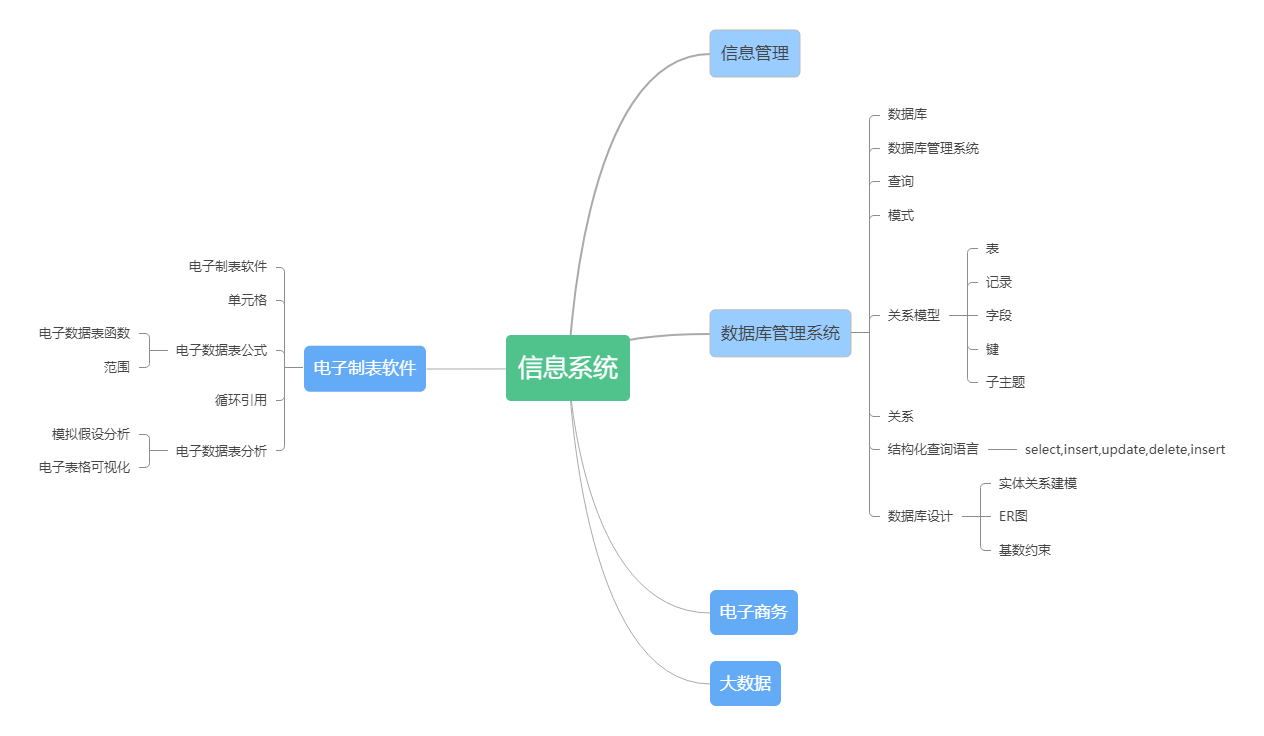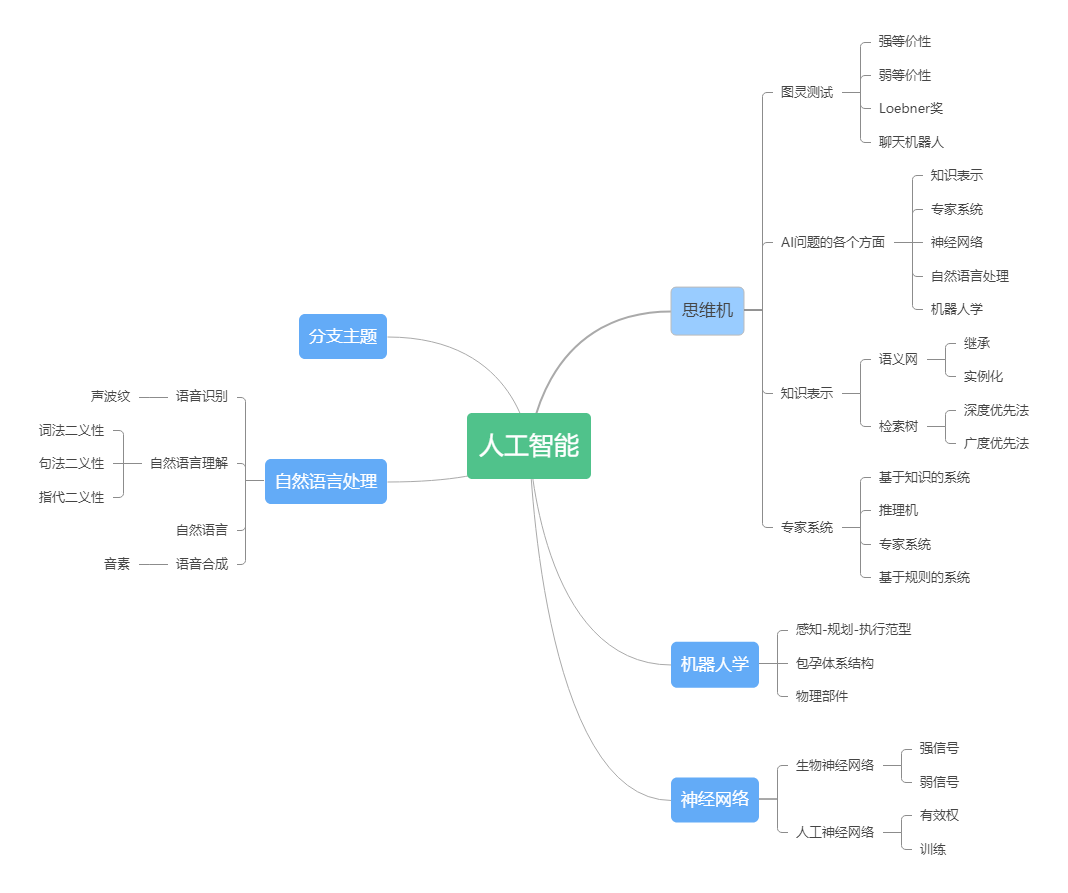第12章、信息系统
学习目标:
- 定义通用系统的角色。
- 解释电子数据表的结构。
- 为数据的基本分析创建电子数据表。
- 用内置函数定义适用的电子数据表公式。
- 设计可扩展的,灵活的电子数据表。
- 描述数据库管理系统的元素。
- 描述关系数据库的结构。
- 在数据库的各元素间建立关系。
- 编写基本的SQL语句。
- 描述实体-关系图。
- 定义并解释电子商务在当今社会的角色。
关键术语:
大数据:big data 键:key 基数约束:cardinality constraint 查询:query 单元格:cell 范围:range 循环引用:circular reference 记录(或对象、实体):record(or object,entity) 数据库:data base 关系模型:relational model 数据库管理系统:database management system 模式:schema 电子商务:electronic commerce 电子制表软件:spreadsheet 实体关系(ER)建模:entity-relationship(ER) 电子数据表函数:spreadsheet function ER图:eR diagram 结构化查询语言:structured Query Language,SQL 域(或属性):field(or attribute) 表:table 信息系统:information system 模拟假设分析:what-if analysis
knowledge points:
12·1
information system:system consisting of the network of all communication channels used within an organization.
12·2
spreadsheet:a screen-oriented interactive program enabling a user to lay out financial data on the screen.
cell:an element in a spreadsheet that holds data and formulas.
spreadsheet function:calculation functions provided by electronic tabulation software that can beused in formulas.
range:a set of contiguous cells specified with endpoints.
circular reference:A circular reference is a series of references where the last object references the first, resulting in a closed loop.
what-if analysis:A What-if Analysis consists of structured brainstorming to determine what can go wrong in a given scenario; then judge the likelihood and consequences that things will go wrong.
12·3
database:a structured set of data held in a computer, especially one that is accessible in various ways.
database management system:A database management system (DBMS) is system software for creating and managing databases.
query:a request to retrieve data from a database.
schema:specification of data logical structure ina database.
relational model: A database organized in terms of the relational model is a relational database.
table:a collection of database records.
record(or object,entity):a collection of related fields that make up a data base entity.
field(or attribute):a value of a database record.
key:one or more fields that uniquely identify a database record among all records in a database.
structured Query Language,SQL:QL is a domain-specific language used in programming and designed for managing data held in a relational database management system, or for stream processing in a relational data stream management system.
Entity-Relationship(ER) modeling:A basic ER model is composed of entity types (which classify the things of interest) and specifies relationships that can exist between entities (instances of those entity types).
ER diagram:graphic representation ER model.
cardinality constraint:Cardinality constraints specify the number of relationships that an entity can participate in (maximal participation) and furthermore 。
electronic commmerce:

- 区分人类可以解决的最好的问题和计算机所能解决的最好的问题。
- 解释图灵测试。
- 定义知识表示的含义并说明在语义网中如何表示知识。
- 为简单的情况开发检索树。
- 解释专家系统的处理。
- 解释生物神经网络和人工神经网络的处理。
- 列出自然语言处理的各个方面。
- 解释自然语言理解中的各种二义性。
关键术语:
人工智能:Artificial intelligence,AI 音素:phoneme人工神经网络:artificial neural指代二义性:referential ambiguity 广度优先法:breadth-first approach 基于规则的系统:rule-based system 聊天机器人:chatbot 检索树:search tree 深度优先法:depth-first approach 语义网:semantic network 有效权:effective weight 强等价性:strong equivalence 专家系统:expert system 句法二义性:syntactic ambiguity 推理机:inreference engine 训练:training 基于知识的系统:knowlege-based system 图灵测试:turing test 词法二义性:lexical ambiguity 语音识别:voice recognition Loebner 奖:Loebner prize 语音合成:voice synthesis 自然语言:natural language 声波纹:voiceprint 自然语言理解:natural language comprehension 弱等价性:weak equivalence
knowledge points:
13·1
Artificial Intelligence,AI:Artificial intelligence (AI), is intelligence demonstrated by machines, which is unlike the natural intelligence displayed by humans and animal.
Turing test:The Turing test, originally called the imitation game by Alan Turing in 1950, is a test of a machine's ability to exhibit intelligent behaviour equivalent to, or indistinguishable from, that of a human.
weak equivalence:two systems are based on the equivalence of their results.
strong equivalence:the equivalence between two systems based on their results and the processing methods to realize these two results.
Loebner prize:The Loebner Prize is an annual competition in artificial intelligence that awards prizes to the computer programs considered by the judges to be the most human-like.
chatbot:a computer program designed to simulate conversation with human users, especially over the Internet.
13·2
semantic network:A semantic network, or frame network is a knowledge base that represents semantic relations between concepts in a network.
search tree:In computer science, a search tree is a tree data structure used for locating specific keys from within a set.
depth-first approach:Depth-first search (DFS) is an algorithm for traversing or searching tree or graph data structures.
breadth-first approach:Breadth-first search (BFS) is an algorithm for traversing or searching tree or graph data structures.
13·3
knowledge-based system:A knowledge-based system (KBS) is a computer program that reasons and uses a knowledge base to solve complex problems.
expert system:In artificial intelligence, an expert system is a computer system that emulates the decision-making ability of a human expert.
rule-based system: a rule-based system is used to store and manipulate knowledge to interpret information in a useful way.
inference engine:inference engine is a component of the system that applies logical rules to the knowledge base to deduce new information.
13·4
artificial neural network:computing systems vaguely inspired by the biological neural networks that constitute animal brains.
effective weight:Total submerged weight including contents (drilling mud, etc.) of an entire riser or a section of a riser.
training:the process of adjusting weights and thresholds in neural networks to achieve desired results.
13·5
voice recognition:usng computers to recognize what humans say.
natural language comprehension:use computer to make reasonable explanations for the information conveyed by human beings.
voice synthesis: a computer generated voice speaking the output.
natural language:A natural language is a human language.
phoneme:any of the perceptually distinct units of sound in a specified language that distinguish one word from another.
voiceprint:a visual record of speech, analyzed with respect to frequency, duration, and amplitude.
lexical ambiguity:the ambiguity caused by the multiple meanings of the words.Lexical ambiguity is the presence of two or more possible meanings for a single word.
syntactic ambiguity:is a situation where a sentence may be interpreted in more than one way due to ambiguous sentence structure.
referential ambiguity:the ambiguity caused by the presence of substitution items.
脑图小结:
第14章、模拟,图形学,游戏和其他应用
学习目标:
- 定义模拟。
- 举出复杂系统的例子。
- 区分连续事件模拟和离散事件模拟。
- 解释如何应用面向对象的设计原理构造模型。
- 列举并讨论排队系统的四个部分。
- 解释天气和地震模型的复杂性。
- 描述图形图像生成的重要主题。
关键术语:
计算机生物学:computational biology 游戏玩法:game play 计算机游戏:computer gaming 模型:model 游戏引擎:game engine 模拟:stimulation
knowledge points:
simulation:A simulation is an approximate imitation of the operation of a process or system that represents its operation over time.
model:the abstraction of a real system,is the representation of the objects in the system and the rules governing their interaction.
computational biology:Computational biology involves the development and application of data-analytical and theoretical methods, mathematical modeling and computational simulation techniques to the study of biological, ecological, behavioral, and social systems.
game engine:is a software-development environment designed for people to build video games.
one impressive example:
Siri becomes the best friend of a 13-year-old boy with autism.